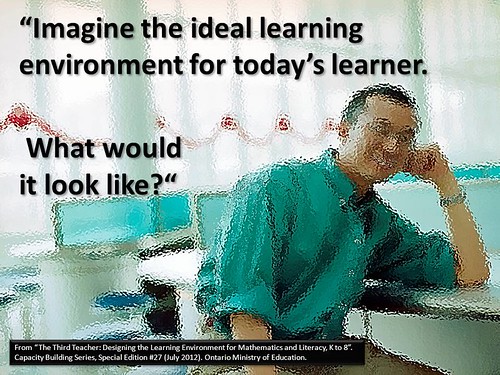During the past week we have focused on a few important areas that can, and do, impact our lives. I found participating in Digifam to be both stress relieving and time creating. Certainly something that we should all consider building into our lives. Thursday was Peace Day an important concept that as a species we do not work particularly hard at maintaining preferring to only focus on it once conflict has started. And Friday was Gratitude day. Another very important word/ action/ emotion that can change the world. I hope that these are not just days that we celebrate but words that we can embed in our and our students lives that will make a difference. Hence, this weeks Food for Thought is written to encourage us to remember the importance of Choice Words as part of our Achievement Culture and the difference this can make.
I start this post with two short videos that create a feel good feeling. The first is an old video that I expect many of you will have seen, but that gives the message that just by changing the words we use we can have a very positive impact. This can be applied not only to our classroom but to our every day lives and relationships.
This second video demonstrates how a simple act of expression can bring so much happiness and joy to those around us. Watch the faces of the young ladies as they read the words that their male counterparts have written about them. Wouldn't it be a wonderful world if everyone made it their job each day to make someone else smile and feel good about themselves? Years ago I taught a lovely family from India who exuded a positive attitude on life no matter what was happening in their world. One day I was chatting and discovered that they were Jains. In our conversation I discovered that they started each day with the namaskara-mantra, that said: “I forgive all beings, may all beings forgive me. I have friendship toward all, malice toward none.” For Jains this translates into kindness to all life.
Our use of choice words has to go far beyond just making students feel happy, although this is of course important. Today there is much written about how choice words associated with failure and how this can be turned from a negative scenario for the student to one which develops a growth mindset, resilience and even grit. In an age when our adolescents are suffering more and more mental stress and illness the development of such attributes in our students is important through the choice use of words. This link takes you to a good presentation produced by the counseling department at RMIT on Self Esteem and Resilience.
"The importance of discovery methodologies and a positive approach to environment in educational sectors has an important and powerful ally: Finnish education scholar and theorist Yrjo Engestrom. In 1998, Engestrom worked with a middle school in a low-income area to help faculty reflect on their practices in an effort to create concrete mechanisms for change to better meet the needs of their student body, through a design research undertaking organized by the University of Helsinki’s Change Laboratory.
Engestrom and his colleagues coordinated a number of discussion sessions for staff and faculty at the school, providing no other objective than a space to talk constructively about daily teaching practices geared toward concrete mechanisms. The teachers’ ideas on what constituted ideal education outcomes differed with their daily practice, so they embarked on implementing a final project where each student would produce a concrete artifact to denote their learning. The project provided students with a capstone for their experience, and allowed the teachers an opportunity to document the learning journey."
Finally, I have added another short video that links with the Mindshift research about how our perceptions impact our of thinking and actions about events around us. Viewing this video from a school point of view it should encourage us to get to know our students and colleagues and their lives better if we are to avoid making judgments based on our own backgrounds and priorities.
Have a good Sunday,
Yours
Adrian


